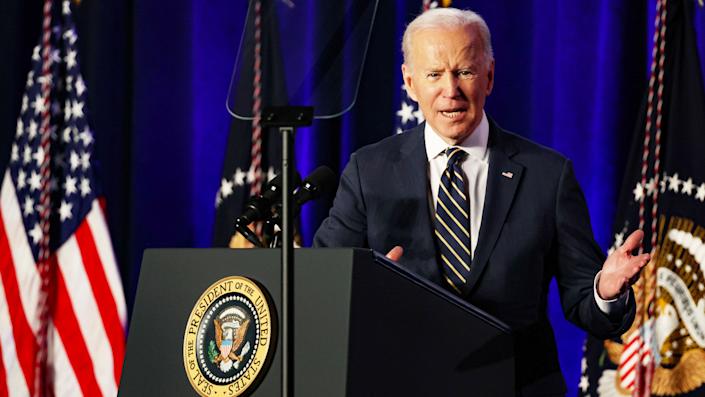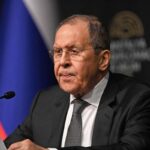WASHINGTON — Seeking to further punish Russian President Vladimir Putin for what he described as a “merciless assault” on Ukraine, President Biden said on Friday that he would move to revoke Russia’s status as a top trading partner with the United States.
The action, Biden explained, would “make it harder for Russia to do business with the United States” by allowing for new taxes on imports from which nations with most-favored status are exempt. The European Union and Group of Seven nations — which include Japan, Canada and the United Kingdom — are taking similar steps, which could deal Russia what Biden described in his White House remarks as a “crushing blow.”
Congress will have to take up the matter, but given the rare eagerness with which Democrats and Republicans have united around a single foe, this latest effort to isolate Russia could be realized within a matter of days.
“The free world is coming together to confront Putin,” Biden said. “Our two parties here at home are leading the way.”
Putin does have a key ally: China, which trades far more with Russia ($147 billion last year) than it does with second-place Germany ($65 billion) or distant-fifth United States ($35 billion). Beijing has done its best to remain neutral when it comes to the Ukraine conflict and has not been party to any of the restrictive new trade policies directed at the Kremlin.
Still, the loss of premier trading status across Canada, Japan and much of Europe means that Russian exporters — already caught in a hostile global economy — will now face the possibility of tariffs on the goods they are looking to sell abroad. And even though the trade relationship with China remains stable, it is not clear just how much more that relationship can be expanded simply because Moscow has few other friends left.
Earlier this week, American financial giants Goldman Sachs and JPMorgan Chase said they were ending business in Russia, further underscoring the costs both ordinary Russians and Russian elites are bearing for the unprovoked attack on Ukraine that Putin began last month. So far, diplomatic efforts to end the conflict have failed.
“Putin’s actions are causing massive harm to the Russian people,” former Finnish Prime Minister Alexander Stubb tweeted. “The sanctions will be as total as the isolation. No area will be spared: finance, trade, goods, services, individuals, culture, sport, energy, transport. Reserves will not last forever.”
American officials have said U.S. troops would not fight in Ukraine. Economic means are thus seen as the best way to convince Putin to withdraw troops from sovereign Ukrainian territory, an occupation that has already taken the lives of thousands of Russian troops and hundreds of Ukrainian civilians.
“Russia has now become a global economic and financial pariah,” the White House said in announcing the move, which comes with an outright ban of imports from Russia of luxury goods like vodka and caviar — two poignant symbols of the country after two decades of Putin’s rule, which has enriched a class of oligarchs known for their lavish lifestyles.
Biden called those oligarchs “corrupt billionaires,” and the Treasury Department moved on Friday to implement new sanctions on Russia’s ruling elite. “They support Putin, they steal from the Russian people and they seek to hide their money in our countries,” Biden said.
“They must share in the pain of these sanctions,” Biden continued, vowing to go after “their superyachts and their vacation homes.” Later in the morning, he signed an executive order banning the export of American luxury goods to Russia.
Congress gave Russia access to permanent normal trade relations (PNTR) — also known as most-favored-nation status — in 2012 as a sign that it had become a democracy that had recovered from the chaos and corruption of the early post-Soviet days. Yet antidemocratic abuses by the Kremlin, including the death of imprisoned attorney Sergei Magnitsky, made some wonder if Russia was deserving of such privilege.
“This culture of impunity in Russia has been growing worse and worse,” said Sen. John McCain, R-Ariz., at the time.
Today, Cuba and North Korea are the only nations in the world that can’t claim the favored-nation protections of the PNTR, underscoring how quickly Russia is being expelled from virtually all U.S. economic arrangements.
Even Iran retains PNTR status, though trade with the Islamist republic has been sanctioned, to the point of nonexistence, since 1987. Venezuela, another adversary, also retains its favored-nation status. In fact, it appears to be on the cusp of selling oil to the United States again, in a stark contrast to Russia’s narrowing trade options. (Congress suspended oil imports from Russia earlier this week, thus making Venezuela’s vast oil reserves a potentially attractive option.)
Biden said Russia could soon be deprived of loans from the World Bank and the International Monetary Fund, further squeezing a nation cut off from Western financial markets. “He cannot pursue a war that threatens the very foundations of international peace and stability and then ask for financial help from the international community,” the president argued.
As such, the move would be as symbolic as it is economic. Last month’s invasion of Ukraine seemed to reverse three decades of optimism about Russia. Trade relations with Russia were normalized in 1990, with hopes that the Kremlin would steer the nation in the direction of a free-market economy. And for a while, that was indeed the course undertaken by President Boris Yeltsin and his successor, Putin.
Putin ended the “gangster capitalism” of the 1990s, turning the oligarchs who had gotten rich during that time essentially into an arm of the Kremlin. Those who weren’t chased out (Boris Berezovsky) or jailed (Mikhail Khodorkovsky) became near-literal vassals of Putin. Meanwhile, he ruthlessly consolidated control over the media and other sectors of free society.
American corporations and legislators were willing to overlook much of that over the last 15 years, though Putin invaded Georgia (2008) and Ukraine (2014). But the second Ukraine invasion — which has been longer and more brutal than the first — has shifted the calculus, and now the same Congress that granted Russia PNTR status could move to revoke the vote of confidence it gave a decade ago.
In his remarks on Friday, Biden made clear that the Russian people have one man to blame, just as his administration has said that Americans upset at higher gas prices should point their finger at the Kremlin, not the White House.
“Putin is an aggressor. He is the aggressor. And Putin must pay the price.”




